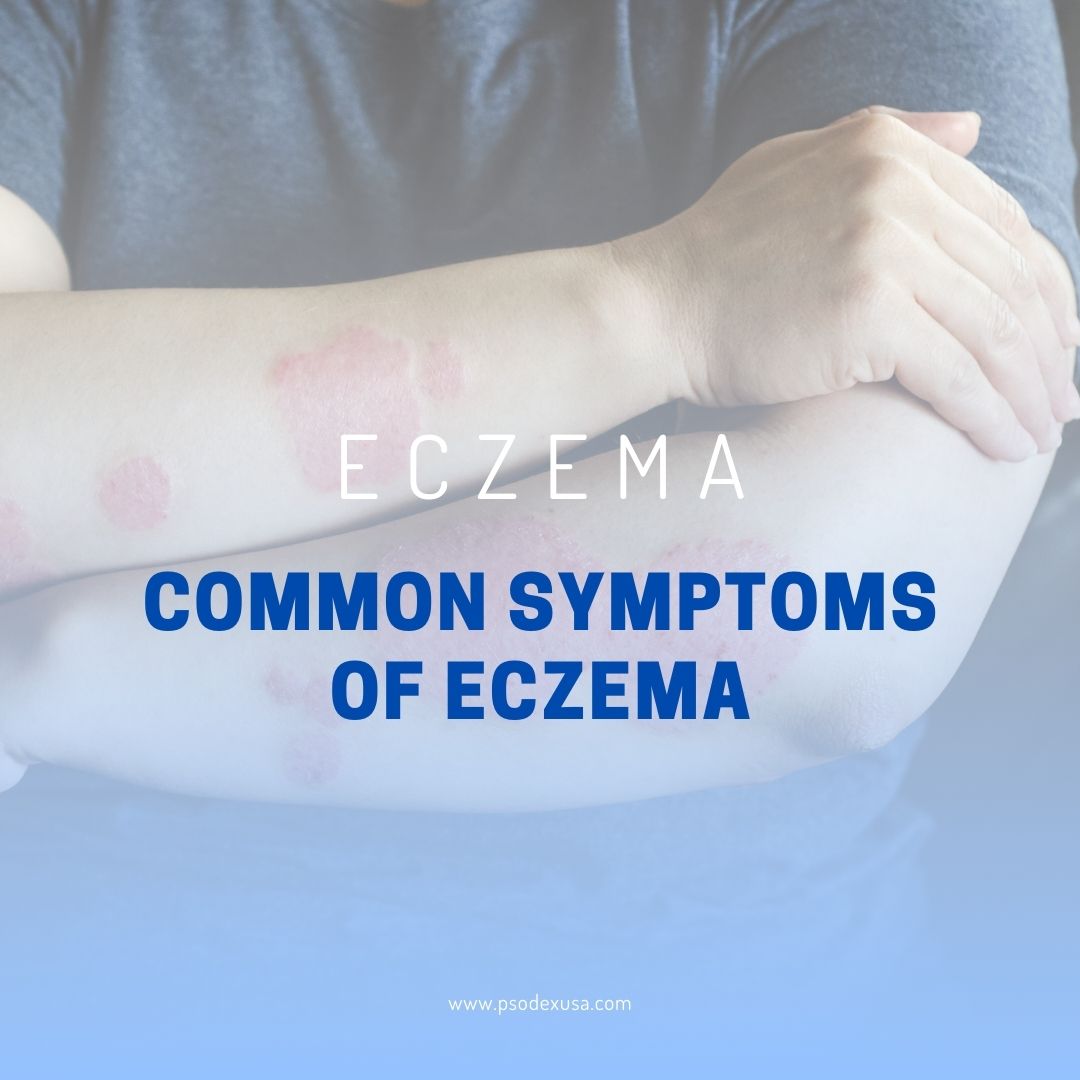Common Symptoms of Eczema

Eczema, or atopic dermatitis, can be a challenging condition to cope with. Understanding its common symptoms is a crucial step in managing and seeking the appropriate treatment. This article will guide you through the prevalent indicators of eczema, helping you recognize and comprehend the condition better.
Red or Brownish-Gray Patches of Skin: The Telltale Sign
One of the hallmark symptoms of eczema is the presence of red or brownish-gray patches on the skin. These patches can vary in size and are often accompanied by dryness and itchiness. They are indicative of inflammation in the affected area and can appear anywhere on the body, depending on the individual.
The Unrelenting Itch: A Distinctive Feature
Intense itching is a defining characteristic of eczema. The itchiness can range from mild to severe and can become particularly distressing during eczema flare-ups. The urge to scratch can be challenging to resist, but excessive scratching can exacerbate the condition and lead to complications.
Small, Raised Bumps: Papules and Vesicles
Eczema often leads to the formation of small, raised bumps on the skin. These bumps, known as papules, may contain fluid and can ooze or crust over when scratched. The presence of these papules is a clear indicator of eczema, and they contribute to the overall discomfort experienced by individuals with the condition.
Dry, Scaly, or Thickened Skin: The Texture of Eczema
In addition to red patches and papules, individuals with eczema frequently experience changes in skin texture. The affected skin may become dry, scaly, or thickened. These alterations in skin texture are a result of the skin’s impaired barrier function and can lead to further complications if not managed appropriately.
Sensitivity and Rawness: Consequences of Scratching
Excessive scratching is a common response to eczema-related itching. However, this can lead to sensitivity and rawness in the affected areas. The skin becomes more susceptible to irritation and potential infection due to the breakdown of the skin barrier. Recognizing the signs of sensitivity and rawness is essential for effective eczema management.
Eczema Flare-Ups: Unpredictable Worsening
While these are the key symptoms of eczema, it’s important to note that the condition often follows a pattern of flare-ups and remissions. During a flare-up, the symptoms can worsen, causing increased discomfort and distress. Flare-ups can be triggered by various factors, including allergens, irritants, and stress.
Location Matters: Where Eczema Appears
Eczema is not limited to a specific part of the body; it can manifest on various areas. Common locations for eczema patches include the face, neck, hands, and the folds of the elbows and knees. It can also affect the feet, scalp, and even the eyelids. The specific location of eczema can influence the management and treatment approach.
Emotional Impact: Dealing with Psychological Aspects
Eczema isn’t just about the physical symptoms; it can have a significant emotional impact. The itching, discomfort, and visible skin changes can lead to feelings of self-consciousness and reduced self-esteem. Recognizing and addressing these emotional aspects is essential for holistic eczema management.
Complications: Potential Risks
If left untreated or if the itching and scratching persist, eczema can lead to complications. These may include skin infections, scarring, and changes in skin color. Being aware of these potential risks underscores the importance of proactive eczema management. Seeking Professional Advice: Your Path to Effective Management Recognizing the common symptoms of eczema is the first step in effectively managing the condition. If you suspect you have eczema or are already diagnosed, seeking advice from a healthcare professional, such as a dermatologist, is crucial. They can provide guidance on treatment options, lifestyle adjustments, and skincare routines tailored to your specific needs.
Empowering Yourself with Knowledge
Eczema can be a challenging condition, but with awareness and understanding of its common symptoms, you can take a proactive approach to its management. Recognizing the signs early, addressing the emotional impact, and seeking professional advice can significantly improve your quality of life as you navigate the journey of living with eczema.
Helpful Links:
National Eczema Association (NEA):https://nationaleczema.org/
American Academy of Dermatology (AAD):https://www.aad.org/
Mayo Clinic:https://www.mayoclinic.org/
WebMD: https://www.webmd.com/
eczema.org: https://eczema.org/
Keywords:
Eczema, Atopic Dermatitis, Eczema Treatment, Eczema Symptoms, Eczema Causes, Eczema Management, Eczema Relief, Eczema Cream, Eczema Home Remedies, Eczema Skin Care, Eczema Rash, Eczema Diet, Eczema Causes and Triggers, Eczema Natural Remedies, Eczema Medications, Eczema in Children, Eczema in Adults, Eczema Prevention, Eczema Flare-Ups, Eczema and Allergies, Eczema Itch Relief, Eczema and Stress, Eczema Support Groups, Eczema Cream Reviews, Best Moisturizers for Eczema, Eczema-friendly Clothing, Eczema and Climate, Eczema Care Tips, Eczema and Skin Hydration, types of eczema, type of eczema, dyshidrotic eczema, eczema symptoms, symptoms of eczema, nummular eczema, eczema treatments, eczema causes, eczema causes, what eczema is, Eczema, Atopic Dermatitis, Eczema Treatment, Eczema Symptoms, Eczema Causes, Eczema Management, Eczema Relief, Eczema Cream, Eczema Home Remedies, Eczema Skin Care, Eczema Rash, Eczema Diet, Eczema Causes and Triggers, Eczema Natural Remedies, Eczema Medications, Eczema in Children, Eczema in Adults, Eczema Prevention, Eczema Flare-Ups, Eczema and Allergies, Eczema Itch Relief, Eczema and Stress, Eczema Support Groups, Eczema Cream Reviews, Best Moisturizers for Eczema, Eczema-friendly Clothing, Eczema and Climate, Eczema Care Tips, Eczema and Skin Hydration
